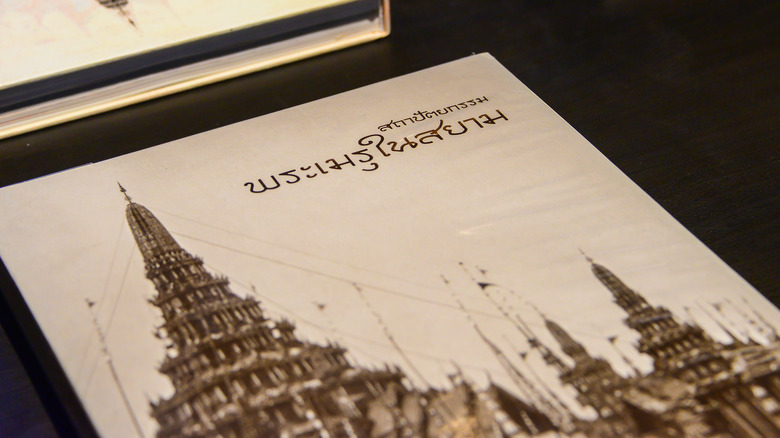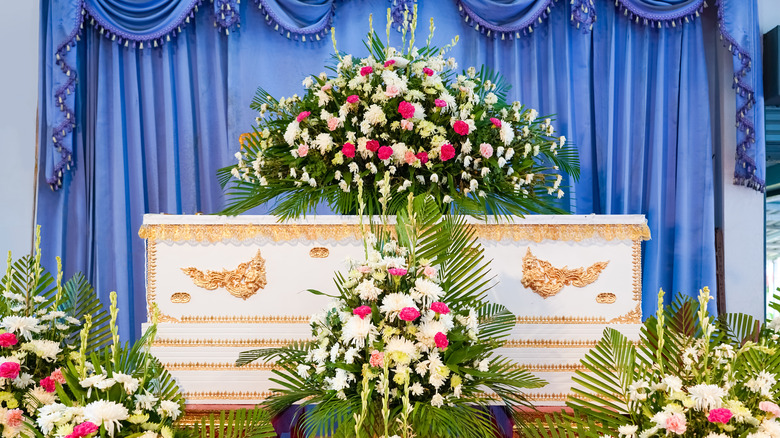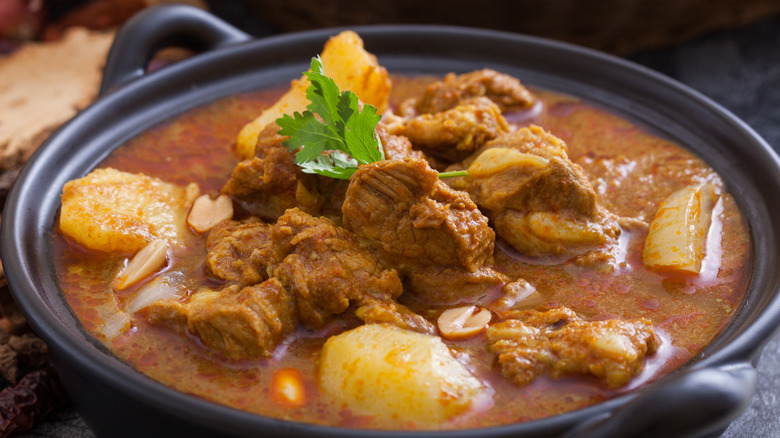The Tradition Of Funeral Cookbooks Keeps Family Recipes Alive In Thailand
"Show me the manner in which a nation cares for its dead, and I will measure with mathematical exactness the tender mercies of its people, their respect for the laws of the land, and their loyalty to high ideals." If you've seen this quote before by William Gladstone, chances are, you saw it at a funeral parlor. Indeed, this is a favorite quote of funeral directors, and it works as a tidy explanation for why we should continue to spend money on making death a dignified affair. But the quote also underlines the fact that the rituals surrounding death and grieving speak volumes about a culture.
Cultural responses to death vary, with funeral proceedings ranging from bleakly somber to downright jovial (looking at you, New Orleans). Still, no matter the culture, food is often a key player in our preparation and acceptance of grief. One need only think about funeral potatoes or funeral pies. As Catawiki notes, there's a whole genre of cookbooks centered around funerals, from "Death Warmed Over" to "The Southern Sympathy Cookbook," both cooking tomes inspired by the parade of food that often follows the burial of a loved one.
In Thailand, food and funeral traditions are often intertwined. One of the most famous incarnations of this is the funeral cookbook, precious culinary tomes that are helping preserve Thai cuisine. But what are funeral cookbooks?
Cremation volumes: a bittersweet memento
To tell the story of funeral cookbooks, we must first explain its precursor, cremation volumes. According to Nourishing Death, it's a long-cherished tradition to hand out gifts to funeral participants. One such gift is cremation volumes (nang sue anusorn ngan sop), or funeral books, a pamphlet created by family members and loved ones containing an intimate collection of stories and details about the deceased as well as their favorite writings.
Bangkok Post notes that these mementos began popping up as early as the 1860s, upon the death of King Rama V. The earliest incarnations of these funeral books contained dry religious texts, but in our more modern times, these books have become more personal, including glimpses into the departed's life like their favorite songs and recipes.
Grant A. Olson wrote in "Asian Folklore Studies" that one of the important aspects of cremation volumes is that they often included out-of-print texts and forgotten traditions, from religious essays to notes on railway travel, acting as invaluable cultural artifacts. This significance also carries over to the recipes featured since recipes were rarely recorded in Thai history. As Atlas Obscura explains, the Thai people were very reticent to share recipes, equating it to selling family secrets, with the potential to damage their social status. Traditionally, recipes were passed down orally from one family cook to another. So what helped Thai families relax enough to begin including written recipes in funeral books?
Funeral cookbooks become a culinary heirloom
The publication of Thailand's first cookbook, "Mae Khrua Hua Pa" ("Talented Women Chefs"), in 1908, began a cultural shift, embracing sharing culinary knowledge in the written form. Although it was a financial failure at its debut, it became a popular add-on to funeral books, as families felt comfortable sharing a public recipe in place of a personal one (via Atlas Obscura). Soon, grand houses began sharing funeral cookbooks as a way to honor their late, great family cooks, preserving culturally significant recipes. For instance, the Bunnag family is credited with preserving recipes for Thai Massaman curry in their funeral cookbooks.
Beyond appealing to historians, funeral cookbooks have become a coveted resource for chefs devoted to Thai cuisine. One chef who made the most out of funeral cookbooks was David Thompson, head chef of the late Nahm restaurant in London, England (via RANDOM Times). Thompson collected over 500 said cremation volumes, using the recipes to help inspire the menu at the Michelin-starred Nahm.
Chef Bo Songvisava, a former student of Thompson, has also accumulated a vast library of funeral cookbooks. Songvisava uses them not just as a reference for her restaurant Bo.lan, but as a remembrance of the great things Thai women have accomplished in the kitchen. She hopes to have a funeral cookbook of her own one day, similarly highlighting her accomplishments at her restaurant through her treasured recipes.
Hopefully, funeral cookbooks will endure as a record of family memories and Thai history.


